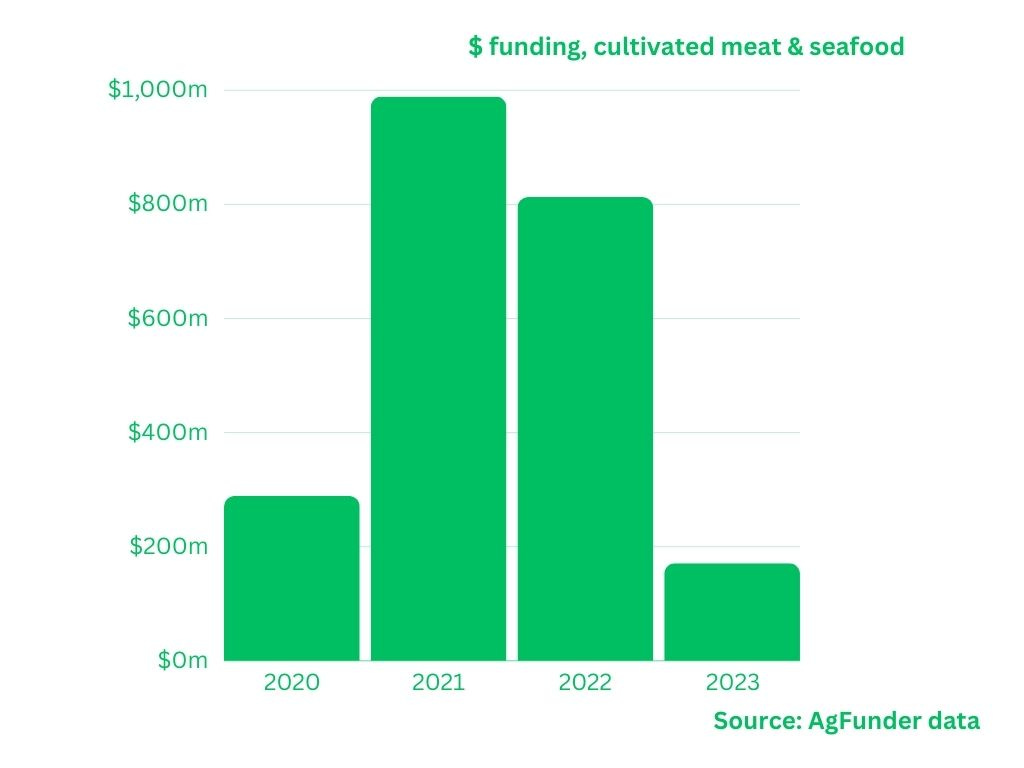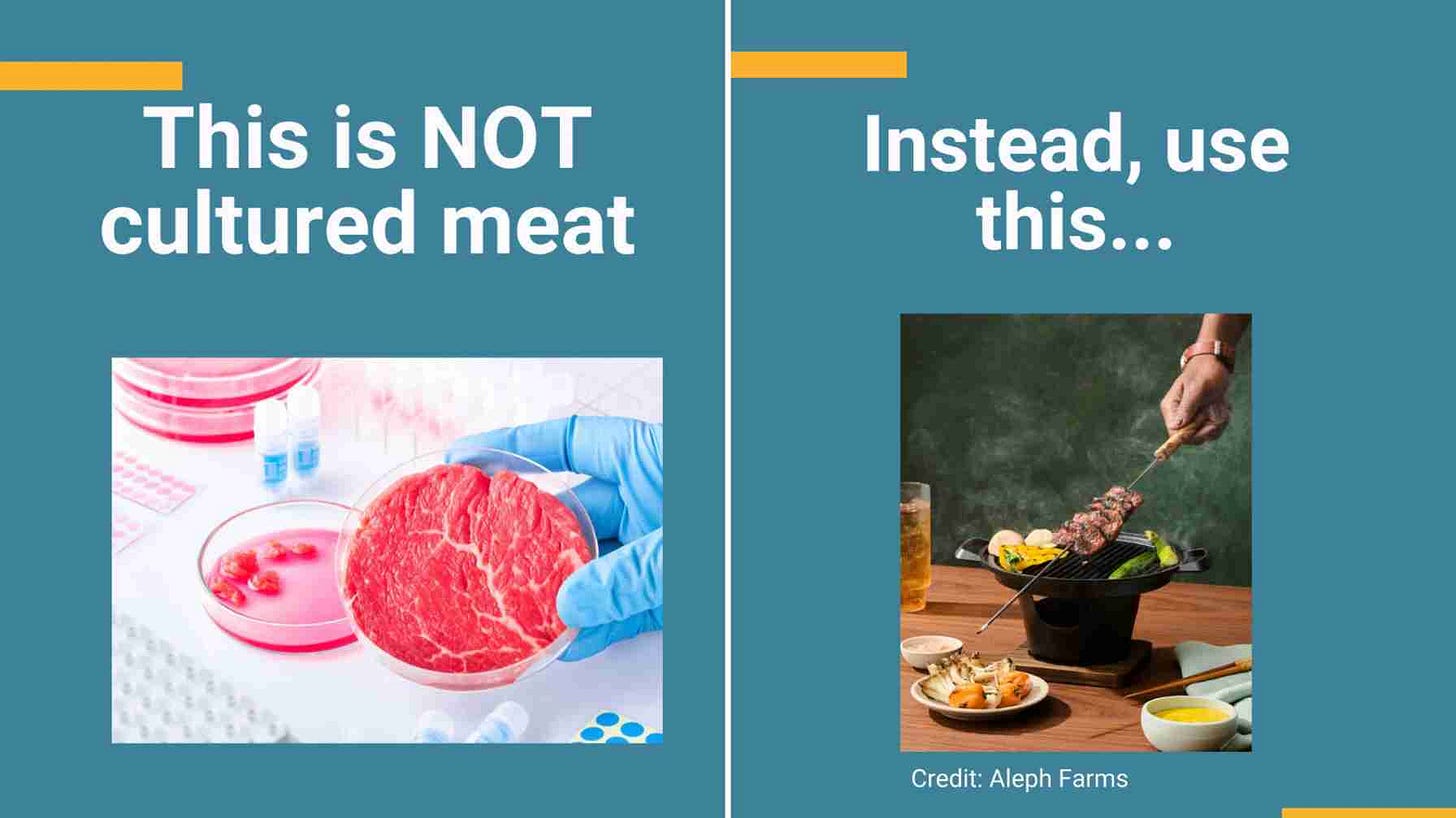US Expands Food Biotech Support, Nestlé Debuts Animal-Free Protein Powder, and Breast Milk Fat From Yeast
Also: European Commission said that Italy's cultivated meat ban violated EU procedures
Hi, thanks for being here! Happy Chinese New Year to those who celebrate! 🐉
Last week, J. P. Lal asked me this thought-provoking question: “What has been your biggest learning since starting the newsletter?”
My biggest learning is that journalists and media professionals are the unsung heroes of the food tech and alt protein industries. By 'journalists', I don't mean someone like me who summarises or aggregates news. I'm not a journalist by any means.
I'm referring to media companies like Green Queen, vegconomist, AgFunder, etc. that do proper reporting. While the spotlight often shines on entrepreneurs, investors, and scientists for their contributions, working on the newsletter has given me a deep respect for journalists.
The accuracy, speed, and comprehensiveness of their work keep us all informed and let the world know about all the cool stuff the industry is working on. And for that, they deserve more recognition.
To all the journalists out there, thank you for your service! 🙏🏾
Alright, let’s dig into the latest developments in biotech-enabled food innovation! 🍽
BIO BUZZ
💪🏾 Nestlé launched its first animal-free protein powder, with 21g of highly digestible protein per serving and 10x more sustainable
The Swiss multinational introduced its first precision fermentation dairy protein powder, an animal-free and lactose-free whey isolate product named Better Whey under the Orgain brand (Nestlé acquired a majority stake in 2022).
As Sonalie Figueiras shared, “According to the company, Better Whey Protein Powder is: lactose-free, animal-ingredients free, highly digestible, 10x more sustainable than conventional whey, gluten-free, sugar-free, hormone-free, antibiotic-free, pesticide-free, and contains a complete amino acid profile.”
Nestlé’s introduction of Better Whey aligns with its commitment to reduce the carbon footprint of its dairy products. By using precision fermentation, the company offers more sustainable protein options and aims to comply with stricter environmental regulations.
At $29.99 per 377g (13.3 oz), it’s a sizeable price premium. I hope the price will come down as they scale. Read more about the product on the website.
🍼 Yali Bio has created the ‘world's first’ breast milk fat from yeast, using precision fermentation to closely match the nutrition of human milk
This breakthrough aims to improve infant formulas by offering an essential component, OPO (Oleic-Palmitic-Oleic), which is vital for infants to absorb nutrients effectively.
Yali Bio's tech allows for the cost-effective production of high-quality structured fats, resembling breast milk fats. It offers a solution to the challenges and expenses associated with producing breast milk fat substitutes through enzymatic interesterification reactions.
Yali Bio’s work is supported by a $370,000 grant from the NIH’s Eunice Kennedy Shriver National Institute of Child Health and Human Development. The support reflects the potential long-term impact of the research on infant nutrition, considering that 130 million babies born annually are fed infant formula at some point, and some mothers face challenges with breastfeeding.
🥛 Remilk became the first company to have its animal-free milk protein greenlit for use in Canada
The Israeli biotech company obtained Health Canada’s “Letter of No Objection” for its animal-free milk protein BLG, becoming the first company to receive approval for a precision fermentation-derived protein in Canada.
This approval enables the use and commercialization of Remilk's BLG in dairy products like milk, ice cream, yoghurt, and cream cheese within Canada, paving the way for innovative dairy alternatives in the country.
Remilk has previously obtained regulatory nods from the FDA and the Singapore Food Agency in February 2023, with a "No Questions Letter," endorsing the company's animal-free protein.
It’s a hattrick of precision fermentation-based milk updates to kick off this week’s issue!
👨🍳 Algae Cooking Club introduced a chef-grade microalgae-based cooking oil with high sustainability credentials and health benefits
The oil has a high smoke point of 535°F/280°C, is rich in omega-9 fatty acids, and has significantly lower carbon emissions and water usage compared to cooking oils such as avocado, canola, and olive oil.
The product is championed by renowned three-Michelin-starred chef Daniel Humm, Algae Cooking Club's Culinary Officer. The oil is described as a light, neutral oil with a hint of a buttery note, and a rich, rounded, non-greasy mouthfeel.
The production process of the oil involves fermentation. Feeding on sugar, the microalgae grow in bioreactors, so the company doesn’t need to harvest algae from natural habitats. In just 3 days, oil makes up 80% of the algae’s content by weight.
🥚 Ivy Farm Technologies partnered with Fortnum & Mason to develop the world's first scotch egg containing cultivated meat
The cultivated meat scotch egg was created for a panel to discuss the future of meat production and highlight the environmental impact of industrial farming without current plans for commercial sale at Fortnum & Mason.
Fortnum & Mason expressed excitement over the collaboration to create the scotch egg, highlighting the brand's long-standing commitment to innovation and the role of their Food & Drink Studio in leading discussions on the future of meat production through tech and science.
Ivy Farm Technologies sees the collaboration with Fortnum & Mason to create a cultivated meat scotch egg as an opportunity to demonstrate how traditional, beloved foods can be sustainably reproduced with innovative meat alternatives.
🐶 Bond Pet Foods shipped 2 metric tons of animal protein produced via fermentation to Hill’s Pet Nutrition
This marks a significant step in their collaboration, enabling Hill’s to start developing prototypes for regulatory review and market testing.
Bond Pet Foods uses a proprietary fermentation process to create a protein ingredient specifically for pet food. This method results in a product that nutritionally mirrors conventional meat but is more environmentally friendly.
The partnership, which began in late 2021, initially focused on developing an alternative to a key meat protein used by Hill’s. Following this success, the companies have entered into a second joint development agreement to explore additional sustainable animal proteins for Hill’s product lineup.
🐮 ProFuse Technology launched a non-GMO bovine cell line enabling indefinite cell division for cultivated meat production
PROFUSE-B8 is highly efficient in both proliferation and differentiation phases, with the cell line demonstrating stable performance over a year and after 90 passages.
When combined with ProFuse Tech's media supplement, PROFUSE-S1, the cell line enables higher yields, shorter production cycles, and substantial cost reductions.
Beyond beef, the Israeli startup is developing additional cell lines for pork, lamb, chicken, and fish with the same spontaneously immortalised characteristics. The startup plans to license these advancements to cultivated meat companies.
🍔 Impossible Foods partnered with the US Army Central to introduce plant-based meat products in military dining facilities overseas
Impossible stated that the initiative comes as a result of the growing demand for more plant-based meal options across the military.
Peter McGuinness, CEO of Impossible Foods, said that the troops in regions including North Africa, the Persian Gulf, the Middle East, and Southwest Asia “will be able to enjoy our nutrient-dense and delicious Impossible Beef and Impossible Burgers that provide high-quality protein, fiber, and iron with no cholesterol”.
Impossible Foods' partnership with the US Army Central aligns with its strategy to broaden the reach of its plant-based products. By targeting diverse sectors like the military and educational institutions, the company promotes plant-based eating as a healthy, sustainable choice for consumers of all dietary preferences.
🍅 First genetically modified food crop becomes available to home gardeners in the US
Norfolk Healthy Produce has launched online seed sales of the Purple Tomato, a new variety developed by Norfolk Plant Sciences, that contains high levels of anthocyanins due to bioengineering with snapdragon genes.
The Purple Tomato seeds are priced at $20 for a packet of 10, exclusively available in the US following regulatory approval by the USDA, FDA, and EPA. The variety is an indeterminate cherry tomato that grows similarly to other tomatoes.
Surveys indicate that 80% of American consumers are interested in eating, purchasing, and growing the bioengineered purple tomato, with only 5% not interested.
MACRO STUFF
🇪🇺 European Commission said that Italy violated EU procedures by banning cultivated meat without consulting the Commission
According to the European Commission, the draft laws should have been subjected to the TRIS procedure. This procedure is intended to prevent national parliaments from passing bills that could affect the European Single Market without consulting other member states and the Commission.
However, the Italian government passed the laws without completing this process, despite objections from within the EU. Despite the European Commission's criticism, Hungarian Agriculture Minister supports Italy's ban.
The Good Food Institute Europe criticised the Italian law for being based on misinformation and excluding industry voices. They argue it limits consumer choice and economic opportunities in the cultivated meat sector, suggesting Italy needs to reconsider its stance for a more informed debate.
🌏 New report explores the behaviours and attitudes of consumers in Southeast Asia regarding plant-based meat
Consumer attitudes and opportunities: Consumers who are most enthusiastic about plant-based meat also eat conventional meat the most. Older consumers (over the age of 35) show more interest in plant-based meat than younger consumers, contrary to expectations. Health is a major selling point for plant-based meat with 65% of survey respondents selecting “healthy” as the top descriptor for plant-based meat.
Price sensitivity: Affordability is key. Up to 76% of consumers indicate they would consume more plant-based meat if it were more affordable. If plant-based meat manages to achieve a 20% lower price than conventional meat, more than 80% of all consumers would buy it, including about half of those who would otherwise reject it.
Market potential with price adjustments: If concerns around cost and other issues are addressed, ~50% of respondents would often opt for plant-based meat, and 15% would always do so. The current price of plant-based meat is, on average, 35% higher than conventional meat.
🇬🇧 New interdisciplinary study in the UK will examine the impact of cultivated meat on society
Cultivated meat offers sustainable and ethical benefits for the planet, human well-being, and animal welfare, but uncertainties about its large-scale production and societal and environmental impacts remain.
The research is sponsored by prestigious institutions, including the British Academy and the Royal Academy of Engineering. It will assess technical production aspects (cost, energy, waste disposal, and environmental impact), potential job threats to farming, and legal issues related to the international trade of cultivated meat.
The interdisciplinary study involving experts from law, sociology, and biochemical engineering plans to engage with industry experts, the public, and potential consumers through interviews and workshops. The results will be shared widely with scientists, policymakers, and the general public.
🤔 FDA is about to undergo a major reorganisation. What does it mean for alt protein regulation?
After a critical infant formula crisis in February 2022, the FDA is undergoing its largest reorganisation, affecting its human foods program and regulatory affairs.
This will lead to an overhaul of the Center for Food Safety and Applied Nutrition (CFSAN) and the Office of Food Policy and Response. It is the CFSAN’s Office of Food Additive Safety (OFAS) that is responsible for dealing with regulatory approval of alt protein products.
Alt protein industry representatives highlight the importance of continued FDA leadership in novel food techs. They advocate for sufficient resources and staffing, especially for the Office of Food Additive Safety, to avoid delays in the progress of the alt protein industry.
BIO BUCKS
🇺🇸 US Department of Defense launched an investment program to promote biotech to advance national and economic security
The Distributed Bioindustrial Manufacturing Investment Program (DBMIP) will allocate Defense Production Act funding to strengthen domestic biomanufacturing supply chains, with the DoD planning to award ~30 proposals up to $1.5 million each in May.
The initiative provides an opportunity for food tech companies to enhance national security and promote sustainability by innovating in food production techs. This includes exploring precision fermentation, cultivated meats, and other advanced biomanufacturing techniques that align with both military needs and sustainability goals.
The program is a component of the strategy outlined by President Biden’s Executive Order 14081, which aims to advance biotechnology and biomanufacturing for a sustainable and secure American bioeconomy.
🇺🇸 US Department of Energy announced an $83M funding opportunity to reduce emissions, with a focus on the alternative protein industry
The funding aims to support 3-8 proposals within the F&B industry, with awards ranging from $500,000-$7 million, specifically targeting the decarbonisation of alt protein production.
The department has identified alt protein production, including plant-based, precision-fermented, and cell-cultivated products, as a critical area for emissions reduction. The funding aims to support innovations that cost-effectively reduce Scope 1 and 2 GHG emissions across various manufacturing and processing stages.
“Alternative proteins strongly outperform conventional meat for several environmental impact factors and have the potential for significant decarbonization of F&B industrial sector. Innovation in alternative protein products and processing is needed to drive down emissions in this growing space.” - DOE
🇳🇱 Future Food Fund II raised €40M to invest in agricultural and food tech startups with a focus on ecological impact
The European Investment Fund (EIF) contributed €20 million to FFF II, which is part of the European Commission's Invest EU program, highlighting the fund's alignment with European efforts to create a sustainable and resilient food system.
FFF II has already invested in EV Biotech, a company specialising in the development and optimisation of precision fermentation strains and processes, and in Extracellular, a CDMO scale-up and development partner for cultivated meat.
The fund also collaborates with influential Dutch organisations such as Wageningen University & Research, Oost NL, and the Northern Netherlands development agency NOM to strengthen the Netherlands' leadership in agrifood tech and sustainability.
📉 Cultivated meat funding declined 78% in 2023, according to preliminary AgFunder data
Industry experts predict a shakeout within the cultivated meat sector due to over-saturation and scalability challenges. They also recognise the potential for consolidation and eventual recovery as part of the industry's natural progression.
Notable investments in 2023 included Uncommon's $30 million Series A round and Meatable's $35 million Series B round, indicating some continued interest in the sector despite the downturn.
Challenges such as general risk aversion, high interest rates, and scalability issues have contributed to a difficult funding environment for cultivated meat and seafood companies.
🇬🇧 Campden BRI and Cellular Agriculture secured a share of a £15.6M investment fund to support cultivated meat product development
The funding from Innovate UK and the Biotechnology and Biological Sciences Research Council (BBSRC) will be used to develop a hollow-fibre bioreactor system prototype for cultivated meat production that will be optimised at Campden BRI's facilities.
Hollow-fibre bioreactors provide significant benefits over traditional cell culture methods, including higher cell density, cost-efficiency, lower medium and growth factor use, and significant time savings.
Campden BRI will collaborate with Cellular Agriculture to test production samples and develop food safety, quality, regulatory, economic, and sustainability assessments. Campden will then use the knowledge acquired during the project to create e-learning courses and supporting services.
SOCIAL FEAST
📷 Stop using cliché stock photos of meat in petri dishes to depict cultivated meat. Let’s use accurate images of real products
Cultivated meat is produced in advanced manufacturing facilities, not in simple lab setups (as often depicted in stock images). The production adheres to the highest food safety standards.
James Ryall highlights the importance of accurate representation in the media regarding cultivated meat, discouraging the use of cliché and misleading stock photos.
He urges journalists and bloggers to showcase the real products and facilities of companies involved in cultivated meat production to provide a truthful perspective.
I am guilty of doing this myself when I use DALL-E to create images of cultivated meat facilities. I will be more conscious of this going forward!
Read full post on LinkedIn - James Ryall
🤦🏾♂️ Yes, cultivated meat isn’t ready, but that doesn't mean it will never be
Elliot Swartz points out the oversimplification of the cultivated meat industry by mainstream media. Despite the focus on two companies, he notes that there are 100+ others working on manufacturing and more in various parts of the value chain, with the number growing year over year.
Mainstream media prematurely judge cultivated meat's failure, citing $3 billion in investment and an 8-year effort that hasn't toppled the global meat industry but doesn't acknowledge the ongoing and expanding efforts in the field.
Mike expresses frustration with "bandwagon journalism" and questions the eagerness to declare cultivated meat a lost cause despite the continued efforts of many smart people working towards its development.
Read full post on X - Michael Grunwald and Elliot Swartz
MORE ON BETTER BIOECONOMY
🚀 10 notable developments in the fermentation-based food industry last month
That’s a wrap. Thank you for taking the time to read this edition!
Are you new here?
Know anyone else who would dig this newsletter?









Thanks so much for putting this together